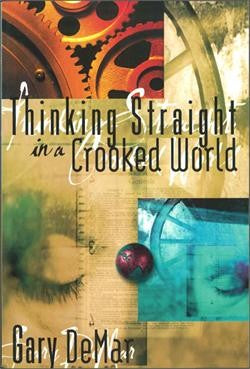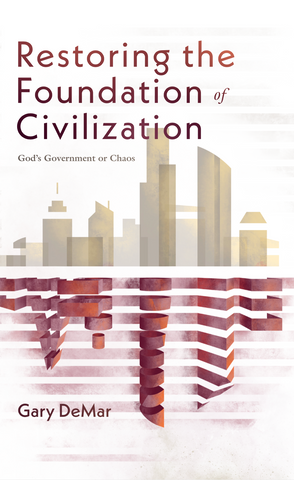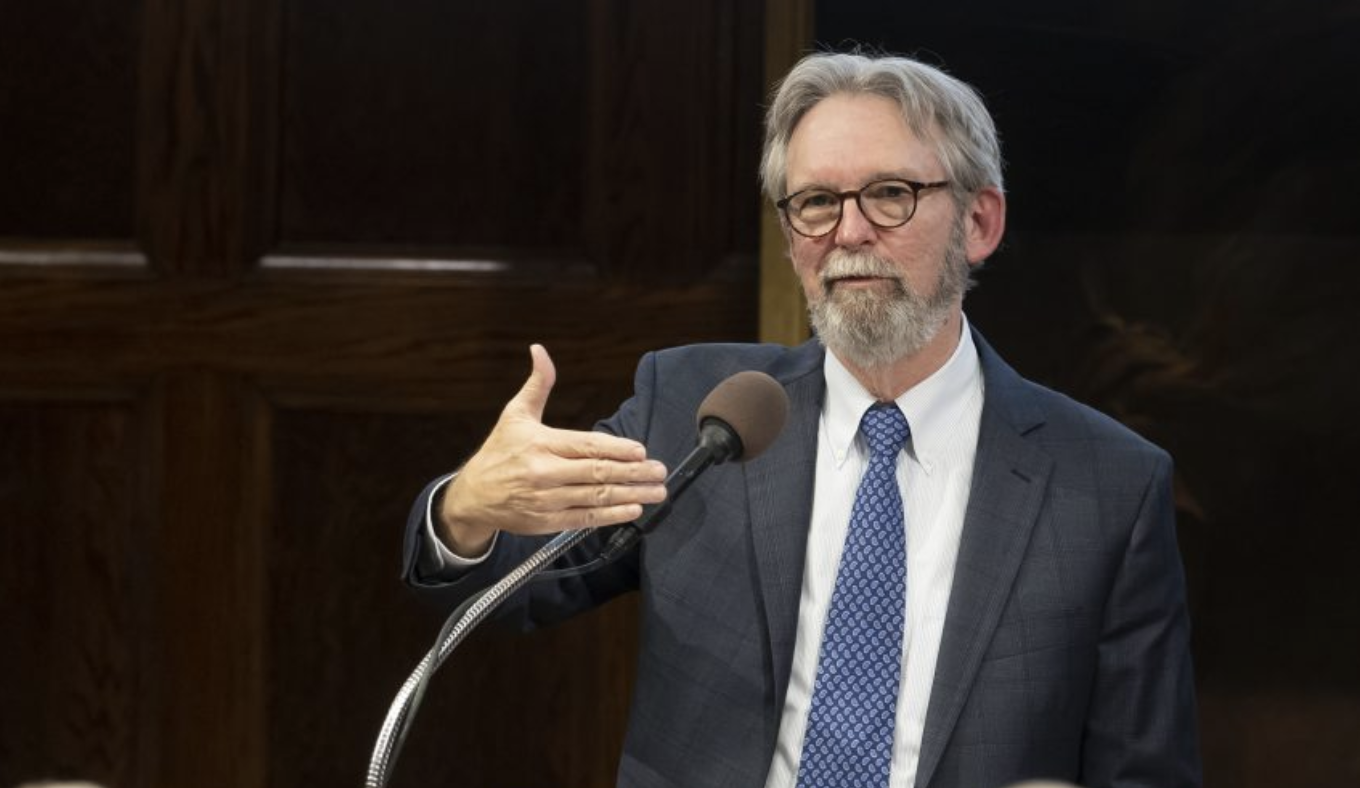Some recent news stories caught my attention. The first is about Michael Cassidy, a conservative Christian and former Navy pilot who tore down a Satanic altar in the Iowa State Capitol during Christmas in 2023. There was also a Nativity scene. He was originally charged with fourth-degree criminal mischief. Tearing down the Satanism display was later designated a hate crime.
The next news story is about a 30-year-old pro-life activist who tried to rescue the unborn from America’s massive abortion industry who sentenced to nearly five years in prison for her actions that violated the Freedom of Access to Clinic Entrances and is used by Biden’s DOJ against people who are trying to save unborn babies from abortuaries—baby killing centers—masquerading as health clinics.
Then there’s this story:
Nearly 30 years ago, a revered New Testament professor at Duke Divinity School named Richard B. Hays published “The Moral Vision of the New Testament,” a sweeping 508-page meditation of Christian ethics in which Hays concluded that the Christian Bible condemns homosexual acts. Hays called homosexuality “one among many tragic signs that we are a broken people” and said that churches should not sanction or bless homosexual unions.
Now we learn that Hays has changed in position. “In a book scheduled to be released in September, ‘The Widening of God’s Mercy: Sexuality Within the Biblical Story,’ written with his son, Christopher B. Hays, the elder Hays makes an about-face that is already causing an uproar in evangelical circles.” Hays has changed his mind because a “dynamic and gracious God … is willing to change his mind.” Robert Gagnon, a professor of New Testament at Houston Baptist University, who used Hays’ book The Moral Vision of the New Testament in his book The Bible and Homosexual Practice: Texts and Hermeneutics, had this to say: “God hasn’t changed his mind. Hays and son have changed their minds. They are now swimming in the sea of heresy, rejecting the clear and overwhelming witness of Scripture….” Even Camille Paglia gets it: “Nothing … better defines the decadence of the West to the jihadists than our toleration of open homosexuality and this transgender mania now,” Paglia said during an October 22, 2015, interview on the Brazilian television program “Roda Viva.”

Thinking Straight in a Crooked World
The nursery rhyme "There Was a Crooked Man" is an appropriate description of how sin affects us and our world. We live in a crooked world of ideas evaluated by crooked people. Left to our crooked nature, we can never fully understand what God has planned for us and His world. God has not left us without a corrective solution. He has given us a reliable reference point in the Bible so we can identify the crookedness and straighten it.
Buy NowYou don’t need to be a biblical scholar to assess the “queer” nature of homosexuality. It makes no sense naturally, against “the natural function” (Rom. 1:26-27) as Paul put it and is biblically untenable in terms of creation (God created them “male and female”: Gen. 1:27; Matt. 19:4) and specific texts condemning same-sex sexuality. The creational/biological realities are alone enough to dismiss same-sex sexuality, sexual fluidity, gender dysphoria, and transgenderism. Refutations of the moral claim for homosexuality are ubiquitous. Greg L. Bahnsen wrote a definitive study and evaluation of homosexuality in 1978 under the title Homosexuality: A Biblical View. The following from Bahnsen’s work is the main reason why some Christians are capitulating to the groundswell of pressure from homosexual rights activists:
God’s Word does not view homosexual activity as anyone’s civil right; rather, the magistrate has a God-given right to interfere in the behavior of men at this point, restraining their homosexual behavior along with the crimes of murder, kidnapping, perjury, etc. [1 Tim. 1:8-10]. One of the purposes for which God’s law was enacted, says Paul, was to restrain public immorality. It is “lawfully used” [1 Tim. 1:8] when applied to restraining such misdeeds as homosexuality [1 Tim. 1:10, arsenokoitai]. And one God-ordained avenue to such public restraint of evildoing is the civil magistrate [Rom. 13:3, 4]. Accordingly, the Christian will view homosexuality not only as a sin, but also as a crime.[1]
It’s the criminal nature of homosexuality that made/makes many Christians react negatively. Bahnsen was right, and most good books presenting the biblical view avoid the civil criminal dimension that would have had an impact on the worship of Satan and the operation of abortuaries. The same could be said for slavery based on Exodus 21:16, Deuteronomy 24:7, 1 Timothy 1:10 (ἀνδραπόδιστης/andrapodistes), and Revelation 18:13 (“bodies, and human lives”). They are content to oppose same-sex sexuality, for the church not to be attacked, for the courts to stop listing public opposition to homosexuality as a hate crime and forcing compliance in hiring and firing. Where has this approach gotten us? We as a nation and church are worse off because we have not taken God’s Word seriously. Reconstructionists have been warning Christians for decades that argument by “truce”—if you leave us alone, we’ll leave you alone—would never work.
Michael Horton described Reconstructionists as “zealous postmillennialists” who “are in danger of turning law into gospel” and “confusing salvation and earthly utopia.” He then charged Reconstructionists with defining the “kingdom as geopolitical.”[2] Not one of these charges has any basis in fact. (See the Preface to Bahnsen’s book Homosexuality for a straightforward refutation, and there are many others). Similar charges have been answered so many times in numerous books and newsletters that I am not going to take the time to answer them here.[3] It is obvious that Horton has not read much Reconstructionist literature.
Horton would place himself squarely within the Reformed tradition. He would claim to follow the views of John Calvin, J. A. Alexander, Charles Hodge, A. A. Hodge, and B. B. Warfield. Using only a single example, let us compare Horton’s views with those of A. A. Hodge, Professor in Systematic Theology at Princeton Seminary from 1877 until his death in 1886. Hodge made the case that “the kingdom of God on earth is not confined to the mere ecclesiastical sphere, but aims at absolute universality, and extends its supreme reign over every department of human life.”[4] The implications of such a methodology are obvious: “It follows that it is the duty of every loyal subject to endeavour to bring all human society, social and political, as well as ecclesiastical, into obedience to its law of righteousness.”[5] In addition, he had no problem in teaching that there are political implications to the preaching and application of the gospel. Consider the following:
It is our duty, as far as lies in our power, immediately to organize human society and all its institutions and organs upon a distinctively Christian basis. Indifference or impartiality here between the law of the kingdom and the law of the world, or of its prince, the devil, is utter treason to the King of Righteousness. The Bible, the great statute‑book of the kingdom, explicitly lays down principles which, when candidly applied, will regulate the action of every human being in all relations. There can be no compromise. The King said, with regard to all descriptions of moral agents in all spheres of activity, “He that is not with me is against me.” If the national life in general is organized upon non‑Christian principles, the churches which are embraced within the universal assimilating power of that nation will not long be able to preserve their integrity.[6]
Hodge calls the Bible the “great statute‑book of the kingdom.” In effect, he is a “biblicist” who believes the Bible should be used as a textbook on social theory. This is Christian Reconstruction in a nutshell! Horton rejects all of this. He claims that “there are two kings and two kingdoms, each ruling a distinct sphere¼. In the kingdom of culture, what Augustine called ‘the city of man,’ there are rulers, there are laws, there are customs which are regulated by human wisdom.”[7] What is the foundation for human wisdom in a strictly secular materialistic worldview driven by the scientific enterprise of evolution?
Regarding law, was Hodge “in danger of turning law into gospel” when he wrote that “this law ¼ demands instant and absolute obedience, not only from all classes of Christians, but also in every sphere of human life equally”?[8] There is no room for lawlessness in Hodge’s view, either for the church or the world. The fact that evangelicals are debating whether homosexuality is a sin is an indication that licentiousness has been turned into gospel. There’s always a danger of turning law into gospel. Horton rightly criticizes the hypocrisy of evangelicalism because while many preach against lawlessness many still practice it. For proof he writes that “evangelical Christians are just as likely to embrace life‑styles every bit as hedonistic, materialistic, self‑centered, and sexually immoral as the world in general. The statistics are neck and neck.”[9] On the one hand Horton criticizes Christians who call for a more consistent application of the whole law of God. On the other hand, he laments that evangelicals are as lawless as the world.
Horton stated that a person’s position on abortion “is not an article of Christian faith.” While Horton agrees that abortion is “savage inhumanity” that must be ended, it “is not in the Apostle’s Creed.”[10] The Apostles’ Creed is not a complete statement of orthodoxy. The doctrine of verbal inspiration is not in the Apostles’ Creed, and neither is salvation by grace. Horton believes making a person’s position on abortion a test of orthodoxy would mean substituting “the Gospel for [a] moral ¼ test.”[11] Would this also be true for homosexuality?
A person’s profession of faith is measured by his deeds, like the way a good surgeon is known by how well he performs in the operating room. James uses language that causes many Protestants discomfort: “You see that a man is justified by works, and not by faith alone” (James 2:24).

Restoring the Foundation of Civilization
There are many Christians who will not participate in civilization-building efforts that include economics, journalism, politics, education, and science because they believe (or have been taught to believe) these areas of thought are outside the realm of what constitutes a Christian worldview. Nothing could be further from the truth.
Buy NowThe Presbyterian Church in America (PCA), the denomination our church is affiliated with, thought it would have been a good idea to have David French as a panel member to “to help our churches deal with political tensions.”
French has written and spoken defending “drag-queen story hour” as a “blessing of liberty.” He has done the same in support of the legalization of so-called gay marriage. French called a law like the one in Texas that would investigate parents who subject their children to chemical or surgical mutilation of their sexual organs (so-called gender reassignment surgeries) an “illiberal extreme.” He has stated that support for the current Republican presidential candidate is evil, idolatrous, and anti-democratic, that “Trump deserves not one single Christian vote if and when he chooses to run for president again.” He and his wife left the PCA because, as his wife put it, the PCA is “brimming with neo-Confederates.” He recently starred in (the atheist) Rob Reiner’s documentary… (Source).
The geniuses in the PCA thought this would be a good idea. Former editor of World magazine, Marvin Olasky, was disappointed at the opposition of having French as a panelist.
I might have a slight sympathy for the critics if French were the keynote speaker, but—lighten up, guys—he’s on a panel, and he’ll make it more interesting that it otherwise might be. We might remember that the PCA politically has red, blue, and purple churches (I’m blessed to be an elder in a purple one), and if we can’t get along with each other how do we expect the U.S not to fall apart?
This is the “can’t we all get along” problem. Why does the PCA have “red, blue, and purple churches”? What is being taught in these churches? A PCA member may have a problem voting for Donald Trump (I understand that), but can any Christian vote for a Democrat? Should we make a truce with our enemies so we can all get along? You won’t find that in the Bible.
[1] Bahnsen, Homosexuality: A Biblical View, 123.
[2] Michael Scott Horton, Putting Amazing Back into Grace (Nashville, TN: Thomas Nelson, 1991), 191.
[3] If you would like a description of Reconstructionist principles, see Gary North and Gary DeMar, Christian Reconstruction: What It Is, What It Isn’t(Tyler, TX: Institute for Christian Economics, 1991), Gary DeMar and Peter J. Leithart, The Reduction of Christianity: A Biblical Response to Dave Hunt (Tyler, TX: Dominion Press, 1988), and Gary DeMar, Myths, Lies, and Half-Truths: How Misreading the Bible Neutralizes Christians, rev. ed. (Powder Springs, GA: American Vision, 2010).
[4] Archibald A. Hodge, Evangelical Theology: Lectures on Doctrine (Carlisle, PA: The Banner of Truth Trust, [1890] 1990), 283.
[5] Hodge, Evangelical Theology, 283. Emphasis added. Hodge, too, was a “zealous postmillennialist.” (A.A. Hodge, Outlines of Theology (New York: A.C. Armstrong and Son, 1891), 568-571.
[6] Hodge, Evangelical Theology, 283–284.
[7] Michael Scott Horton, “Beyond Culture Wars,” Modern Reformation (May/June 1993), 2.
[8] Hodge, Evangelical Theology, 280.
[9] Horton, “Beyond Culture Wars,” 3.
[10] Horton, “Beyond Culture Wars,” 2.
[11] Horton, “Beyond Culture Wars,” 2.

